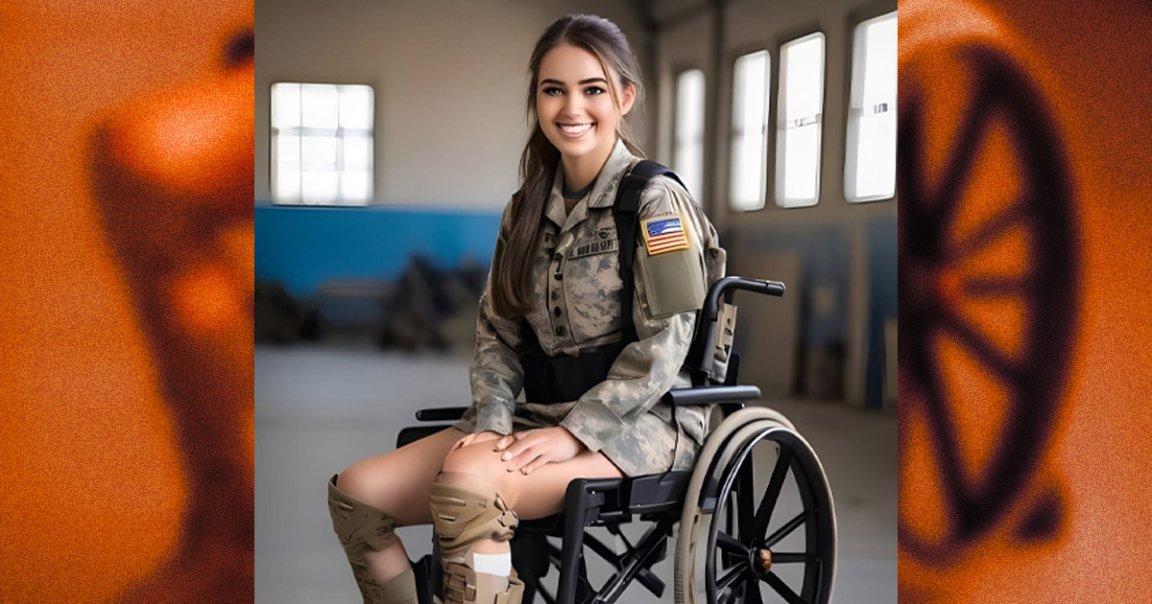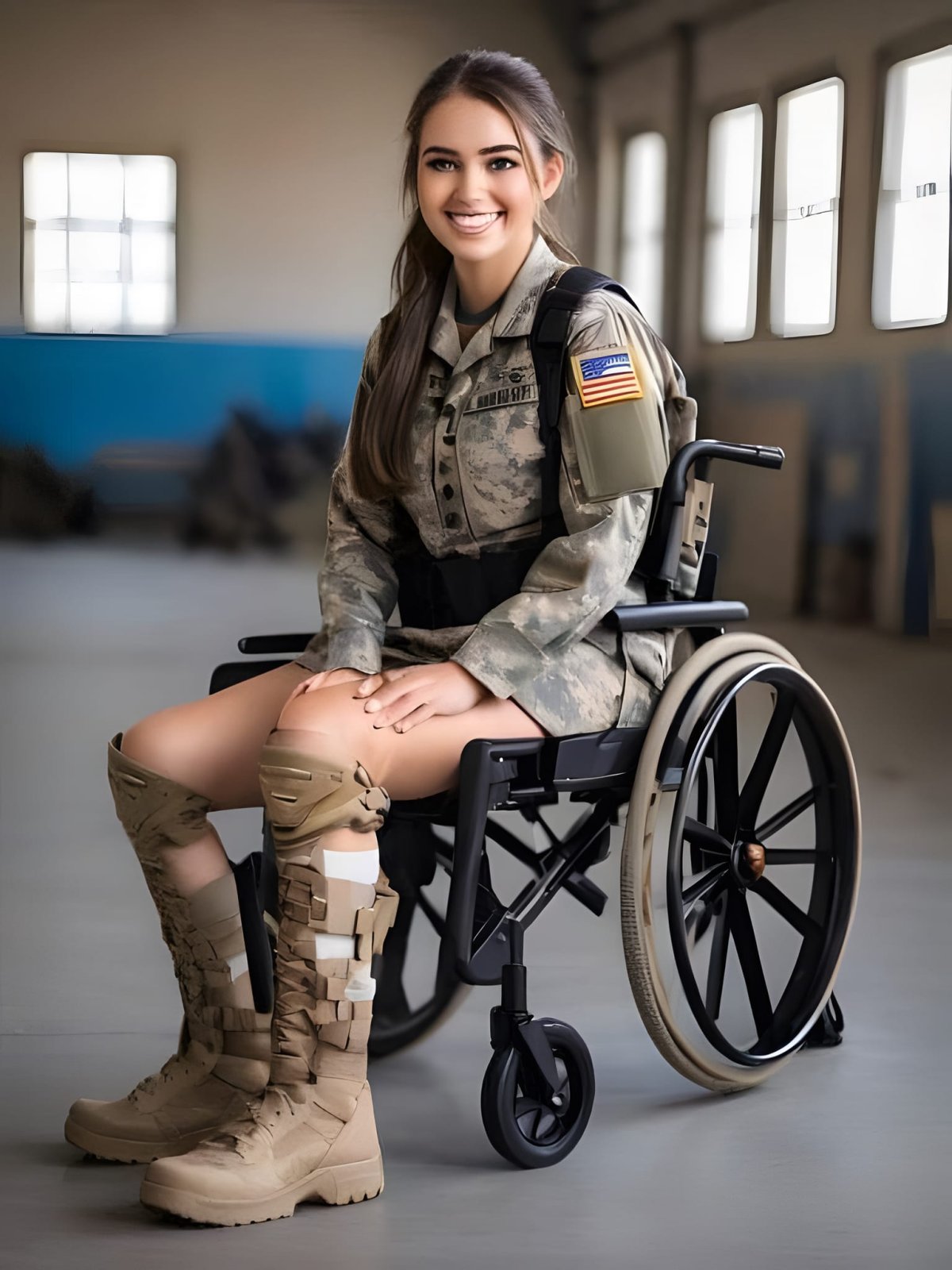
An image, posted this week to a Facebook page called “Summer Vibes,” shows a smiling young woman with brunette hair. She’s dressed in Army fatigues — although, quizzically, she’s not wearing pants, and the mangled American flag patch on the arm of her jacket has only six stripes and zero stars. She’s white. She’s conventionally attractive. And crucially, this grinning young woman is seated in a wheelchair, implying that she’s an injured or disabled veteran.
“Please don’t swip [sic] up without giving some love,” reads the image’s garbled caption. “Without heroes,we [sic] are all plain people,and [sic] don’t know how far we can go.” The caption is then followed by a string of hashtags listing the names of famous actresses like Anne Hathaway, Megan Fox, and Jennifer Lopez (as well as Christian Bale and Chris Evans, for some reason.)

Needless to say, the woman isn’t real. She’s AI-generated, and to many, that’s obvious. In addition to the woefully incorrect American flag tacked onto the uniform, the last name that would normally appear on a soldier’s pocket is an illegible clump of blobs that, when zoomed out, gives off only the semblance of lettering. Her teeth, eyes, and ears are also blurry and uncanny, as are her poorly defined hands.
And yet, despite these obvious flaws, the image has gone viral: at present, it has more than 62,000 reactions, nearly 5,000 comments, and 2,500 shares. And judging by the comments section? A lot of folks — particularly older men — absolutely think she’s the real deal.
“Thank you for your sacrificial service to America and its citizens to maintain, [sic] our Republic, our Constitution and our God given [sic] rights and freedoms!” wrote one commenter, noting that he served in the military during the Vietnam war. “Thank you Summer, you are a beautiful, brave young lady!” he added, rounding the post out with heart, American flag, Statue of Liberty, and bald eagle emojis.
“Thank you my sister in arms,” wrote another older man, “bless you for your service and dedication.”
“Beautiful,” added yet another. “Thank you for your service and prayers for healing and mercies and comfort from our Lord Jesus Christ Amen.”
“Miss Beautiful USA!” yet another older guy chimed in. “THANK YOU FOR YOUR SERVICE.”
Though the title of the Facebook page — “Summer Vibes” — would suggest a feed of poolside shots and cocktails with tiny umbrellas, its posts are neither summery nor even vibey. It’s a spam page, dedicated to posting what’s likely an automated stream of images and graphics featuring battle-wounded war veterans; each post is outfitted with that same error-packed caption imploring users not to scroll through without “giving some love.” Despite the page’s continued pleas to support the folks in the many photos and graphics, it doesn’t give any information about them, or link to any charities or donations. The page instead keeps posting image after image, begging for likes, comments, and shares.
The vast majority of Summer Vibes’ images appear to be of real veterans. However, most of these posts don’t get a ton of reach — some gain a sparse handful of likes and comments, others might rake in a few hundred on a good day. But like Facebook’s now-infamous Shrimp Jesus AI images, not to mention countless other AI outputs that have recently gone viral on the platform, it seems that the pantsless AI vet was scooped up by Facebook’s recommendation algorithm and took off from there.
It’s concerning for a few reasons. On the one hand, we have plenty of real disabled veterans who deserve care, respect, and medical and financial help. Distracting from these actual humans — who have been historically neglected upon their return from service — with a viral image of a fake one immediately raises ethical red flags. And broadly speaking, images like this clogging up the internet, where real people are still trying to share information and communicate, isn’t great. (We reached out to Summer Vibes, but haven’t received any response.)
Then, of course, there’s the reaction to the image. As far as AI images go, this one isn’t even particularly good or convincing. But some Facebook users — again, mostly older people, and especially older men — fell hook, line, and sinker for the fake photo. Some were even persuaded enough to push back against the few commenters who pointed out that the image was AI-made.
“What makes u so sure of that??” read one such retort.
This kind of reaction also has implications beyond synthetic clickbait. In March, a BBC report revealed that MAGA influencers and pundits were using AI to generate fabricated images of former president Donald Trump posing with groups of Black voters, a demographic group with whom the presidential candidate is hoping to shore up more support in his ongoing 2024 campaign.
When we looked at the comments on one of these fake photos, which was posted to Facebook by a far-right media personality as part of their effort to sell a Rush Limbaugh-inspired Christmas book — yes, seriously — we noticed lauding, clueless comments. Some users praised Trump; some users issued prayers; others simply remarked on the “beautiful photo.” Sound familiar?
And that’s just one example of AI’s convincing use in political content. AI is creeping further into political campaigns and election cycles worldwide, the United States’ 2024 race included, and experts have repeatedly warned of the associated risks. Spamming the web with photos of attractive fake veterans, though an objectively lousy thing to do, is one thing. But after spending some time in the cursed land that is Facebook comments, it’s hard not to come away with the uneasy sense that enough fake images could make a genuine dent in what a large group of individuals believes to be true.
In a consequential year, it might just matter that old dudes on the internet are looking straight past this extremely fake brunette’s mangled fingers and messed-up uniform and thanking her for her service.
More on AI and misinformation: Researchers Say Russia Is Using AI to Predict Terrorism at Paris Olympics